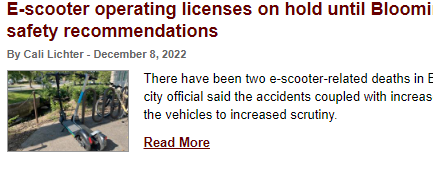Update: Mayor John Hamilton has vetoed this measure. Thank you Mayor Hamilton for your support of the 7-Line! The city engineer has issued a new order keeping the Dunn Street stop sign in place for 180 days. After that a new council will vote again on making that sign permanent, and hopefully not amend the request this time.
Going against the recommendations of their Bicycle and Pedestrian Commission, their Traffic Commission, myself and two other members of the public, and four members of their own body, the Bloomington City Council voted to place three new stop signs on 7th Street. The signs will stop cars on the line, but also will force bicyclists to stop on the 7-Line, Bloomington's bike lane that was named one of the top ten bike projects of 2022.
The 7-Line is a protected bikeway that stretches from the downtown B-Line up to Woodlawn Avenue, close to the heart of the Indiana University campus, and using the 7-Line minimizes the time it takes to get from downtown to campus by bicycle. There are enough heavily-trafficked cross-streets that in many places you might as well still be walking, but bike signals allowing bicycles to cross College Avenue and Walnut Street help to get across those streets. Riding east from the B-Line, you climb a fairly steep hill that peaks on Walnut Street; from there you go down the hill unimpeded all the way to Dunn Street; stop signs at Dunn, Indiana Avenue, and Woodlawn slow you down a bit, but then the roadway opens up to a designated greenway that takes you to the east side without much traffic to worry about.
Going west, the hill between Dunn and Walnut isn't nearly as much fun. It's a bit of climb, but at least you can focus on pushing the pedals and not losing momentum as you go up. That is, until the new stop signs are implemented. These will force bikes to stop dead, a third of the way up the hill, and stop dead again two thirds of the way up. This makes it a practically useless route for cyclists (Why Bicyclists Hate Stop Signs).
So why did the council make this horrific change? The author of the change, Dave Rollo, tried to claim it was all about pedestrians trying to cross 7th Street - but given Rollo's and the other councilmembers' continued antipathy to the 7-Line, the real goal was clearly simply to cripple the route. If pedestrians were the real issue, there are many other crossings around town that need stop signs much more than this bike route. Take this 9th and Walnut intersection for example:
There is even a crosswalk here; but you'd better have your skates on if you want to try to cross it. Traffic comes up from the south and it moves fast across those three traffic lanes and a parking lane. Not for the faint of heart, and absolutely not for the disabled or elderly. This is a perfect place for a stop sign; of course, that would inconvenience drivers, and we can't have that, can we?
RIP to the 7-Line. Eighth Street is one-way east, Ninth one-way west. I will have to try out those alternates to decide on the new best way to bike across town.



